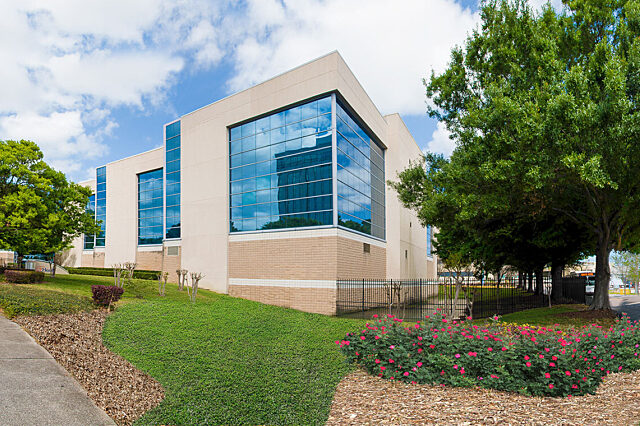International head and neck cancer expert speaks to UF and Shands Jacksonville faculty and staff

Communication after total laryngectomy can be made easier with new technology, an internationally recognized head and neck cancer specialist, and invited speaker, recently told University of Florida College of Medicine-Jacksonville faculty and staff.
Frans Hilgers, M.D., Ph.D., former chairman of head and neck oncology and surgery at the Netherlands Cancer Institute, discussed the benefits and best practices after a total laryngectomy, a procedure that removes a patient’s voice box and requires patients to learn new ways to communicate.
The technologies that Hilgers discussed are now more readily available at Shands Jacksonville Medical Center, speech pathologist Dagnye Dore said.
UF surgeons at Shands Jacksonville perform about 40-60 laryngectomy procedures a year. Shands Jacksonville is the only hospital between Tampa and Atlanta that offers a multidisciplinary approach to treatment of head and neck cancers, which is a main reason the hospital performs among the most in the state, said Iman Naseri, M.D., an assistant professor of surgery.
The procedure is performed on a select group of patients with laryngeal cancer. Similar to other cancers involving the head and neck, laryngeal cancer is usually treated with surgery, radiation therapy and chemotherapy, either used alone or in combination.
About 90 percent of head and neck cancers are caused by tobacco use, but Naseri said they are becoming more prevalent in young people with no history of smoking or drinking, another risk factor. When the cancer is caught in stage 1 or 2, there is a 95 percent cure rate, but when it reaches stage 3 or 4, the survival rate drops to 50 percent, Naseri said.
Hilgers’ speech was tied to Head and Neck Cancer Awareness Week, which included free screenings on campus, to help educate faculty on new technologies and promote early detection.
A total laryngectomy surgery separates the upper and lower airways and results in connection of the tracheal airway to the outside via a stoma in the neck. Unlike a tracheostomy, in which the air continues past the stoma hole in the neck into the nose and mouth, laryngectomy patients may only breathe through their neck. In addition to losing the voice, patients also lose the ability to properly taste and smell, and breathe through their nose and mouth.
The options for speaking after a total laryngectomy include:
Use of an electrolarynx, a handheld device that allows a patient’s voice to be mechanically projected.Esophageal speech, commonly referred to as belch speech, which is difficult and time-consuming for patients to learn.Tracheoesophageal prosthesis (TEP), a prosthesis that is inserted through the common wall of the trachea and esophagus. The object is inserted into a hole the surgeon makes in that wall and allows inhaled air to be directed to the esophagus, which then vibrates, creating sound that is shaped into speech. The Shands Jacksonville operating room is now stocked with these prostheses and supplies so head and neck surgeons can make the punctures at the same time as the total laryngectomy surgery or can be performed at a later date as an outpatient procedure.It is clear that anyone requiring such a surgery will have major life-altering changes, which affect not only patients, but also their families. This includes issues dealing with communication, swallowing and smell and taste deficiencies. Rarely does a treatment for any type of cancer affect so many senses. So it can certainly result in major physical and psychosocial issues that need to be taken into consideration prior to the start of their treatment.
UF&Shands Jacksonville’s multidisciplinary approach to the treatment of such cancers offers this advantage. Not only does this result in better cure rates, but also ensures the best quality of life in the aftermath. For example, the organization has established an electrolarynx loaner program for patients who cannot afford to buy one immediately. A Medicare waiver for the device, which costs between $300 and $700, can take two years to receive, Dore said. Once a patient receives the waiver, they return the device so it can be loaned to another patient.
Outpatient speech therapy is offered both in the UF Otolaryngology Clinic in the Faculty Clinic and in the Pavilion on the UF&Shands Jacksonville campus. The speech and language pathologists are highly experienced in working with patients with history of head and neck surgery, and can greatly assist speech and swallowing.
Hilgers’ speech was sponsored by ATOS Medical Services, one of two major companies that sell voice prostheses and restoration supplies for people who have had laryngectomies. Hilgers, now a professor emeritus at the University of Amsterdam, has retired from clinical work and focuses primarily on research, product design and lectures across the world.